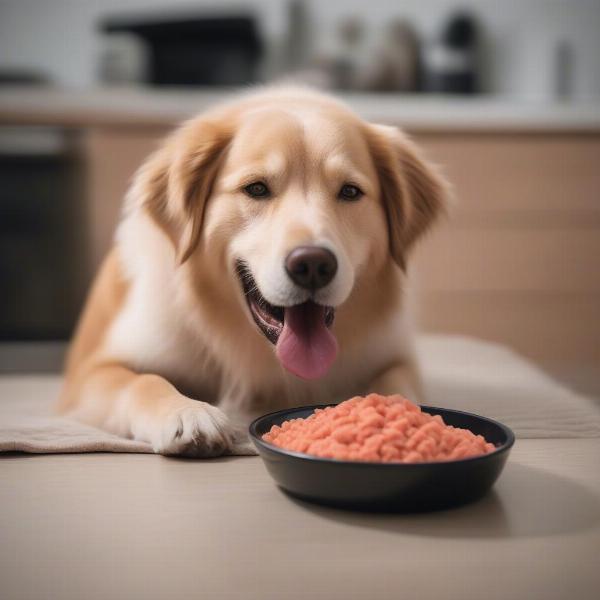Salmon dog food is often touted as a good option for dogs with allergies. But is it really? This article delves into the benefits of salmon for allergic dogs, helps you choose the right salmon dog food, and discusses other important considerations for managing food allergies in your canine companion.
Understanding Dog Food Allergies
Food allergies in dogs can manifest in various ways, from itchy skin and ear infections to gastrointestinal upset. Common allergens include beef, chicken, dairy, wheat, and soy. Salmon, being a less common protein source, is often a suitable alternative for dogs with these sensitivities. It’s rich in omega-3 fatty acids, which can contribute to healthier skin and a shinier coat, often compromised in allergic dogs.
Choosing the Right Salmon Dog Food for Allergies
When choosing a salmon dog food for allergies, look for a “limited ingredient” or “hypoallergenic” formula. These diets typically contain a single protein source (salmon) and a limited number of carbohydrate sources. Avoid foods with artificial colors, flavors, and preservatives, as these can exacerbate allergies. Always check the ingredient list carefully to ensure the food is truly salmon-based and doesn’t contain hidden allergens. “Novel protein” diets, featuring proteins like salmon that your dog hasn’t previously been exposed to, can be particularly beneficial.
Benefits of Salmon for Allergic Dogs
Salmon is packed with omega-3 fatty acids, EPA and DHA, which have anti-inflammatory properties that can help soothe itchy skin and reduce inflammation. It’s also a highly digestible protein source, making it easier on sensitive stomachs. Furthermore, salmon is a great source of essential amino acids crucial for overall health and well-being.
 Dog eating salmon kibble – A happy dog enjoying a bowl of salmon kibble, highlighting the palatability of salmon dog food.
Dog eating salmon kibble – A happy dog enjoying a bowl of salmon kibble, highlighting the palatability of salmon dog food.
Beyond Salmon Dog Food: Managing Allergies Holistically
While switching to salmon dog food is a crucial step, managing dog food allergies often requires a holistic approach. Consult with your veterinarian for a proper diagnosis and to rule out other potential causes of your dog’s symptoms. They can recommend allergy testing to pinpoint specific allergens. sensitive tummy dog food can also be beneficial for dogs with sensitive digestive systems. In addition to diet, consider environmental factors that might be contributing to your dog’s allergies, such as dust mites, pollen, and certain fabrics.
Is Salmon Right For My Dog?
This is a question best answered by your veterinarian. They can assess your dog’s specific needs and health history to determine if salmon is a suitable protein source.
“Introducing a new protein source should always be done gradually,” says Dr. Emily Carter, DVM, “to monitor for any adverse reactions and ensure your dog tolerates the new food well.”
Transitioning to Salmon Dog Food
When introducing salmon dog food, do so gradually over 7-10 days. Start by mixing a small amount of the new food with your dog’s current food, gradually increasing the proportion of salmon dog food while decreasing the old food. This gradual transition helps prevent digestive upset. pig ears for dogs might be a good treat option during this period, but check for potential allergens.
Conclusion
Salmon dog food can be a highly effective solution for dogs with food allergies. Choosing a high-quality, limited ingredient formula, consulting with your veterinarian, and managing environmental factors are all crucial for successfully managing your dog’s allergies and improving their overall health and well-being. Remember to introduce salmon dog food gradually and monitor your dog for any adverse reactions. Choosing the right salmon dog food can lead to a happier, healthier life for your allergic dog.
FAQ
-
How do I know if my dog has a food allergy? The most common signs are itchy skin, ear infections, and gastrointestinal issues. Consult your veterinarian for a proper diagnosis.
-
Are all salmon dog foods good for allergies? No, look for limited ingredient or hypoallergenic formulas.
-
Can I give my dog salmon treats if they have allergies? Yes, but choose treats specifically designed for allergic dogs and introduce them slowly. best grain free skin and coat dog chews could be a suitable option.
-
How long does it take to see improvement after switching to salmon dog food? It can take several weeks to see noticeable improvement.
-
What if my dog doesn’t like salmon dog food? Try different brands or formulas until you find one your dog enjoys. california dog kitchen offers a variety of flavors.
-
Can puppies eat salmon dog food for allergies? Yes, but choose a puppy-specific formula.
-
Besides food, what else can cause allergies in dogs? Environmental allergens like pollen, dust mites, and certain fabrics can also trigger allergies. dog oil for dogs can help soothe itchy skin from environmental allergies as well.
ILM Dog is a leading international website dedicated to providing expert advice on dog care and wellbeing. We offer comprehensive information on a wide range of topics, from breed selection and health care to training, nutrition, grooming, and product recommendations. Whether you’re a new dog owner or a seasoned expert, ILM Dog is your trusted resource for all things canine. For expert guidance and personalized advice, reach out to us at [email protected] or call +44 20-3965-8624. Visit ILM Dog for more valuable insights into the wonderful world of dogs.